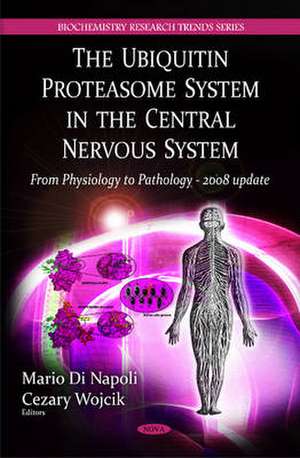Ubiquitin Proteasome System in the Central Nervous System
Editat de Mario Di Napoli, Cezary Wojciken Limba Engleză Hardback – 20 mai 2010
Preț: 1312.54 lei
Preț vechi: 1790.55 lei
-27% Nou
Puncte Express: 1969
Preț estimativ în valută:
251.18€ • 272.75$ • 210.99£
251.18€ • 272.75$ • 210.99£
Carte disponibilă
Livrare economică 01-15 aprilie
Preluare comenzi: 021 569.72.76
Specificații
ISBN-13: 9781607416944
ISBN-10: 1607416948
Pagini: 552
Ilustrații: colour & b/w photos & tables
Dimensiuni: 187 x 264 x 37 mm
Greutate: 1.19 kg
Editura: Nova Science Publishers Inc
Locul publicării:United States
ISBN-10: 1607416948
Pagini: 552
Ilustrații: colour & b/w photos & tables
Dimensiuni: 187 x 264 x 37 mm
Greutate: 1.19 kg
Editura: Nova Science Publishers Inc
Locul publicării:United States
Cuprins
Introduction; Mechanisms & Substrate Specificity of Desumoylating Enzymes; Crosstalk Between the Ubiquitin & Sumo Pathways; The Roles of the Ubiquitin-Proteasome System in the Control of Circadian Clocks; Roles of the Ubiquitin Proteasome Pathway in Transcriptional Regulation; Role & Function of the Ubiquitin-Proteasome System in Neural Stem & Progenitor Cells; Ubiquitin/Proteasome System in Mitotic & Mitotic-Like Regulation During Brain Development & Pathology; Role of Synapse-Localized E3 Ubiquitin Ligase in Regulating Neural Transmission; Regulation of Gabaa Receptor Synaptic Expression by the Ubiquitin Proteasome System; Roles of the Ubiquitin Proteasome System in the Development & Function of the Neuromuscular Junction; The Interrelationship Between Reactive Oxygen Species (Ros) & Proteasome Inhibition as Inducers of Neuronal Cell Death; The Role of the Ubiquitin Proteasome System in Proinflammatory Cytokine Signaling in the Central Nervous System; Role of Immunoproteasomes in Ageing & Neurodegenerative Diseases; Glia, Inflammasomes & Proteasomes in Neurodegenerative & Autoimmune Diseases; The Ubiquitin-Proteasome System & the Aggresome-Autophagy Pathway: Intersecting Mechanisms of Misfolded Protein Clearance in Neurodegenerative Disease; Novel Functions of Parkin; Validity of Targeting the Ubiquitin Proteasome System in the Establishment of New Animal Models of Parkinson's Disease; The Interrelationship Between Autophagy & the Ubiquitin Proteasome System in Als Models; The Role of the Ubiquitin Proteasome System in the Pathogenesis of Huntington's Disease & Other Polyglutamine Disorders; The Ubiquitin Protesome System Dysfunction & Protein Aggregation After Brain Ischemia; Transient Cerebral Ischemia Triggers a Dramatic Activation of Small Ubiquitin-Like Modifier (Sumo) Conjugation -- Possible Significance; Ubiquitination, Sumoylation & De-Sumoylation of Hif-1, a Key Molecule Involved in Brain Development & Adaptation to Hypoxia in Adult Brain; Tuning Nodal Signaling Via the Ubiquitin-Proteasome System; The Role of Ubiquitin Proteasome System & Proteasome Inhibitors in Brain Tumors; Index.
